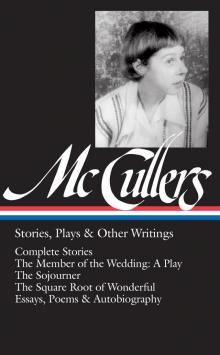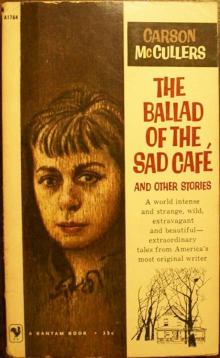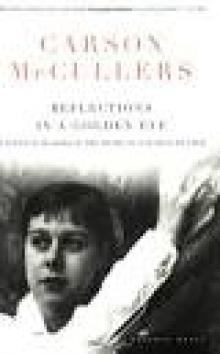- Home
- Carson McCullers
Reflections in a Golden Eye Page 2
Reflections in a Golden Eye Read online
Page 2
She was halfway up the steps before the Captain recovered from his shock. Then he ran trembling after her. 'I will kill you!' he said in a strangled voice. 'I will do it! I will do it!' He crouched with his hand to the banister and one foot on the second step of the stairway as though ready to spring up after her.
She turned slowly and looked down at him with unconcern for a moment before she spoke. 'Son, have you ever been collared and dragged out in the street and thrashed by a naked woman?'
The Captain stood as she had left him. Then he put his head down on his outstretched arm and rested his weight against the banister. From his throat came a rasping sound like a sob, but there were no tears on his face. After a time he stood up and wiped his neck with his handkerchief. Only then did he notice that the front door was open, the house brightly lighted, and all the shades raised. He felt himself sicken strangely. Anyone might have passed along the dark street before the house. He thought of the soldier whom he had left a short while ago on the edge of the woods. Even he might have seen what had occurred. The Captain looked all about him with frightened eyes. Then he went into his study where he kept a decanter of old, strong brandy.
Leonora Penderton feared neither man, beast, nor the devil; God she had never known. At the very mention of the Lord's name she thought only of her old father who had sometimes read the Bible on a Sunday afternoon. Of that book she remembered two things clearly: one, that Jesus had been crucified at a place called Cavalry Hill the other, that once He had ridden somewhere on a jackass, and what sort of person would want to ride a jackass?
Within five minutes Leonora Penderton had forgotten the scene with her husband. She ran the water for her bath and laid out her clothes for the evening. Leonora Penderton was the subject of much lively gossip among the ladies of the post.
According to them her past and present affairs were a rich medley of amorous exploits. But most of what these ladies told was hearsay and conjecture for Leonora Penderton was a person who liked to settle herself and was adverse to complications. When she married the Captain she had been a virgin. Four nights after her wedding she was still a virgin, and on the fifth night her status was changed only enough to leave her somewhat puzzled. As for the rest it would be hard to say. She herself would probably have reckoned her affairs according to a system of her own giving the old Colonel at Leavenworth only half a count and the young Lieutenant in Hawaii several units in her calculations. But now for the past two years there had been only Major Morris Langdon and no one else. With him she was content.
On the post Leonora Penderton enjoyed a reputation as a good hostess, an excellent sportswoman, and even as a great lady. However, there was something about her that puzzled her friends and acquaintances. They sensed an element in her personality that they could not quite put their fingers on. The truth of the matter was that she was a little feebleminded.
This sad fact did not reveal itself at parties, or in the stables, or at her dinner table. There were only three persons who understood this: her old father, the General, who had worried no little about it until she was safely married; her husband, who looked on it as a condition natural to all women under forty; and Major Morris Langdon, who loved her for it all the more. She could not have multiplied twelve by thirteen under threat of the rack. If ever it was strictly necessary that she write a letter, such as a note to thank her uncle for a birthday check or a letter ordering a new bridle, it was a weighty enterprise for her. She and Susie shut themselves in the kitchen with scholarly seclusion. They sat down to a table furnished with an abundance of paper and several nicely sharpened pencils. Then, when the final draft was finished and copied, they were both exhausted and in great need of a quiet, restoring drink.
Leonora Penderton enjoyed her warm bath that evening. She dressed herself slowly in the clothes she had already laid out on the bed. She wore a simple gray skirt, a blue Angora sweater, and pearl earrings. She was downstairs again at seven o'clock and their guests were waiting.
She and the Major found the dinner first rate. To begin with there was a clear soup. Then with the ham they had rich oily turnip greens, and candied sweet potatoes that were a transparent amber beneath the light and richly glazed with sweet sauce. There were rolls and hot spoon bread. Susie passed the vegetables only once and left the serving dishes on the table between the Major and Leonora, for those two were great eaters. The Major sat with one elbow on the table and was altogether very much at home. His red brown face had a blunt, jovial, and friendly expression; among both officers and men he was very popular. Except for the mention of Firebird's accident there was almost no table talk. Mrs. Langdon hardly touched her dinner. She was a small, dark, fragile woman with a large nose and a sensitive mouth. She was very ill and she looked it. Not only was this illness physical, but she had been tortured to the bone by grief and anxiety so that now she was on the verge of actual lunacy. Captain Penderton sat very straight with his elbows held close to his sides. Once he cordially congratulated the Major on a medal he had received. Several times during the course of the meal he flicked the rim of his water goblet and listened to the clear, resonant ring. The dinner ended with a dessert of hot mince pie. Then the four of them went into the sitting room to finish out the evening with cards and conversation.
'My dear, you are a damn fine cook,' the Major said comfortably.
The four people at the table had not been alone. In the autumn darkness outside the window there stood a man who watched them in silence. The night was cold and the clean scent of pine trees sharpened the air. A wind sang in the forest near by. The sky glittered with icy stars. The man who watched them stood so close to the window that his breath showed on the cold glass pane.
Private Williams had indeed seen Mrs. Penderton as she left the hearth and walked upstairs to her bath. And never before in his life had this young soldier seen a naked woman. He had been brought up in a household exclusively male. From his father, who ran a one mule farm and preached on Sunday at a Holiness church, he had learned that women carried in them a deadly and catching disease which made men blind, crippled, and doomed to hell. In the army he also heard much talk of this bad sickness and was even himself examined once a month by the doctor to see if he had touched a woman. Private Williams had never willingly touched, or looked at, or spoken to a female since he was eight years old.
He had been late in gathering the armfuls of damp, rank autumn leaves back in the woods. When at last his duty was done, he had crossed the Captain's lawn on his way to evening mess. By chance he glanced into the sharply lighted vestibule. And since then he had not found it in him to go away. He stood motionless in the silent night with his arms hanging loose at his sides. When at dinner the ham was carved, he had swallowed painfully. But he kept his grave, deep gaze on the Captain's wife. The expression of his mute face had not been changed by his experience, but now and then he narrowed his gold brown eyes as though he were forming within himself some subtle scheme. When the Captains wife had left the dining room, he still stood there for a time. Then very slowly he turned away. The light behind him laid a great dim shadow of himself on the smooth grass of the lawn. The soldier walked like a man weighted by a dark dream and his footsteps were soundless.
Carson McCullers - Reflections In A Golden Eye
CHAPTER 2
Very early the next morning Private Williams went to the stables. The sun had not yet risen and the air was colorless and cold. Milky ribbons of mist clung to the damp earth and the sky was silver gray. The path leading to the stables passed a bluff which commanded a sweeping view of the reservation. The woods were in full autumn color, and scattered among the blackish green of the pine trees there were blunt splashes of crimson and yellow. Private Williams walked slowly along the leafy path. Now and then he stopped altogether and stood perfectly still, in the attitude of one who listens to a call from a long distance. His sun browned skin was flushed in the morning air and on his lips there were still the white traces of the milk he had drunk for bre
akfast. Loitering and stopping in this way he reached the stables just as the sun came up in the sky.
Inside the stable it was still almost dark and no one was about The air was close, warm, and sour sweet. As the soldier passed between the stalls he heard the placid breath of the horses, a sleepy snuffle and a whinny. Dumb, luminous eyes turned toward him. The young soldier took from his pocket an envelope of sugar and soon his hands were warm and sticky with slaver. He went into the stall of a little mare who was almost ready to drop her foal. He stroked her swollen belly and stood for a time with his arms around her neck. Then he let the mules out into their pen. The soldier was not alone with the beasts soon the other men reported for their duty. It was Saturday, a busy day at the stables, as in the morning there were riding classes for the children and women of the post The stable was soon noisy with talk and heavy footsteps; the horses grew restive in their stalls.
Mrs. Penderton was one of the first riders to come this morning. With her, as often, was Major Langdon. Captain Penderton accompanied them today, which was unusual, as he customarily took his ride alone and in the late afternoon. The three of them sat on the paddock fence while their mounts were being saddled. Private Williams led out Firebird first. The injury of which the Captain's wife complained the day before had been greatly exaggerated. On the horse's left foreleg there was a slight abrasion that had been painted with iodine. On being led out into the bright sunlight, the horse rounded his nostrils nervously and turned his long neck to look about him. His coat was curried smooth as satin and his mane was thick and glossy in the sun.
At first glance the horse seemed overgrown and too heavy set for a thoroughbred. His great haunches were broad and fleshy, and his legs were somewhat thick. But he moved with marvelous, fiery grace, and once at Camden he had outraced his own great sire who was a champion. When Mrs. Penderton was mounted, he reared up twice and tried to break away toward the bridle path. Then, straining against the bit, with arched neck and tail raised high, he side stepped furiously and a light froth of foam showed on his muzzle. During this struggle between horse and rider, Mrs. Penderton laughed aloud and spoke to Firebird in a voice that was vibrant with passion and excitement: 'You sweet old bastard, you!' The struggle ended as abruptly as it had begun. Indeed, as this volatile fracas took place every morning, it could hardly be called a real struggle any longer. When the horse, as an ill trained two year old, had first come to the stables, it had been earnest enough. Twice Mrs. Penderton was badly thrown, and once when she returned from her ride the soldiers saw that she had bitten her lower lip quite through so that there was blood on her sweater and shirt.
But now this brief daily struggle had a theatrical, affected air it was a jocular pantomime performed for their own amusement and for the benefit of spectators. Even when the froth showed on his mouth, the horse moved with a certain fractious grace as though aware of being watched. And after it was over he stood quite still and sighed once, in much the same manner as a young husband would sigh laughingly and shrug his shoulders when giving in to the will of a beloved and termagant wife. Except for these mock rebellions the horse was now perfectly trained.
To all the regular riders the soldiers at the stables had given nicknames that they used when speaking among themselves. Major Langdon was called The Buffalo. This was because when in the saddle he slumped his great heavy shoulders and lowered his head. The Major was a fine horseman and, when a young Lieutenant, he had made a rare name for himself on the polo field. On the other hand, Captain Penderton was no rider at all, although he himself was not aware of this. He sat rigid as a ramrod in the exact position taught by the riding master. Perhaps he would not have ridden at all if he could have seen himself from the rear. His buttocks spread and jounced flabbily in the saddle. For this reason he was known to the soldiers as Captain Flap Fanny. Mrs. Penderton was called simply The Lady, so great was the esteem in which she was held at the stables.
This morning the three riders started at a sedate walk, Mrs. Penderton leading. Private Williams stood watching them until they were out of sight. Soon he heard from the ring of the horses' hoofs on the hard path that they had broken into a canter. The sun was brighter now and the sky had darkened to a warm, brilliant blue. In the fresh air there was the odor of dung and burning leaves. The soldier stood so long that at last the Sergeant came up to him and roared good naturedly: 'Hey, Unconscious, you mean to gawk there forever?' The sound of the horses' hoofs could be heard no longer. The young soldier pushed back his bangs from his forehead and slowly set about his work. He did not speak all day.
Then late in the evening Private Williams dressed in fresh clothes and went out to the woods. He walked along the edge of the reservation until he reached the stretch of woods he had cleared for Captain Penderton. The house was not brightly lighted as it had been before. Lights showed only in one room to the right upstairs, and in the small porch leading from the dining room. When the soldier approached, he found the Captain in his study alone; the Captain's wife, then, was in the lighted room upstairs where the shades were drawn. The house, like all the houses on the block, was new, so that there had been no time for shrubs to grow in the yard. But the Captain had had twelve ligustrum trees transplanted and put in rows along the sides so that the place would not seem so raw and bare. Shielded by these thick leaved evergreens, the soldier could not easily be seen from the street or the house next door. He stood so close to the Captain that if the window had been open he could have reached out and touched him with his hand.
Captain Penderton sat at his desk with his back turned to Private Williams. He was in a constant fidget as he studied. Besides the books and papers on his desk there was a purple glass decanter, a thermos bottle of tea, and a box of cigarettes. He drank hot tea and red wine. Every ten or fifteen minutes he put a new cigarette in his amber cigarette holder. He worked until two o'clock and the soldier watched him.
From this night there began a strange time. The soldier returned each evening, approaching by way of the forest, and looked at all that went on within the Captain's house. At the windows of the dining and sitting rooms there were lace curtains through which he could see, but not easily be seen himself. He stood to the side of the window, looking in obliquely, and the light did not fall on his face. Nothing of much consequence happened inside. Often they spent the evening away from home and did not return until after midnight. Once they entertained six guests at dinner. Most evenings, however, they spent with Major Langdon, who came either alone or with his wife. They would drink, play cards, and talk in the sitting room. The soldier kept his eyes on the Captain's wife.
During this time a change was noticed in Private Williams. His new habit of suddenly stopping and looking for a long time into space was still with him. He would be cleaning out a stall or saddling a mule when all at once he seemed to withdraw into a trance. He would stand immovable and sometimes he did not even realize when his name was called. The Sergeant at the stables noticed and was uneasy. He had occasionally seen this same queer habit in young soldiers who have grown homesick for the farm and womenfolk, and who plan to 'go over the hill.' But when the Sergeant questioned Private Williams, he answered that he was thinking about nothing at all.
The young soldier spoke the truth. Although his face wore an expression of still concentration, there were in his mind no plans or thoughts of which he was aware. In him was a deep reflection of the sight he had seen that night when passing before the Captain's lighted vestibule. But he did not think actively of The Lady or of anything else.
However, it was necessary for him to pause and wait in this trancelike attitude, for far down in his mind there had begun a dark, slow germination.
Four times in his twenty years of life the soldier had acted of his own accord and without the pressure of immediate circumstance. Each of these four actions had been preceded by these same odd trances. The first of these actions was the sudden, inexplicable purchase of a cow. By the time he was a boy of seventeen, he had accumulated
a hundred dollars by plowing and picking cotton. With this money he had bought this cow, and he named her Ruby Jewel. There was no need on his father's one mule farm for a cow. It was unlawful for them to sell the milk, for their makeshift stable would not pass government inspection, and the milk that she yielded was far more than their small household could use. On winter mornings the boy would get up before daylight and go out with a lantern to his cow's stall. He would press his forehead against her warm flank as he milked and talk to her in soft, urgent whispers. He put his cupped hands down into the pail of frothy milk and drank with lingering swallows.
The second of these actions was a sudden, violent declaration of his faith in the Lord. He always had sat quietly on one of the back benches of the church where his father preached on Sunday. But one night during a revival he suddenly leaped up onto the platform. He called to God with strange wild sounds and rolled in convulsions on the floor. Afterward he had been very languid for a week and he never again found the spirit in this way.
The third of these actions was a crime which he committed and successfully concealed. And the fourth was his enlistment in the army.
Each of these happenings had come about very suddenly and without any conscious planning on his part. Still in a curious way, he had prepared for them. For instance, just before the purchase of his cow he had stood gazing into space for a long while and then he cleaned out a lean to by the barn that had been used for storing junk; when he brought home the cow there was a place ready for her. In the same manner he had got his small affairs in order before his enlistment. But he did not actually know that he was going to buy a cow until he counted out his money and put his hand on the halter. And it was only as he stepped over the threshold of the enlistment office that the vaporish impressions within him condensed to a thought, so that he realized he would be a soldier.

 Carson McCullers
Carson McCullers Clock Without Hands
Clock Without Hands The Ballad of the Sad Cafe: And Other Stories
The Ballad of the Sad Cafe: And Other Stories The Member of the Wedding
The Member of the Wedding Collected Stories
Collected Stories The Ballad of the Sad Cafe
The Ballad of the Sad Cafe Reflections in a Golden Eye
Reflections in a Golden Eye The Heart Is a Lonely Hunter
The Heart Is a Lonely Hunter Carson McCullers - Reflections In A Golden Eye
Carson McCullers - Reflections In A Golden Eye Collected Stories of Carson McCullers
Collected Stories of Carson McCullers